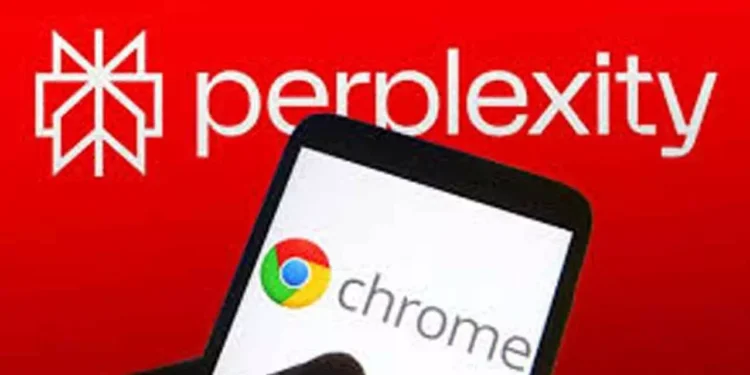AI startup Perplexity has stunned Silicon Valley with an audacious $34.5 billion cash offer to buy Google’s Chrome browser. This comes as federal antitrust pressure mounts against Google, pointing to a possible transformation in how we might browse the internet.
The offer dwarfs Perplexity’s own $18 billion valuation by nearly double. Yet the company claims multiple investors have pledged full funding for the deal. This happened just weeks after Perplexity launched its AI-powered Comet browser, positioning itself as Chrome’s direct competitor.
Perplexity Chrome Acquisition Timing Aligns With DOJ Case
The U.S. Department of Justice wants Google to divest Chrome following last year’s antitrust ruling. A federal judge declared Google maintains an illegal monopoly in internet search, making Chrome a key battleground.
Chrome gives Google access to billions of users and their browsing data. This information fuels Google’s advertising empire. The DOJ argues forcing Chrome’s sale would level the playing field for search competitors.
Google calls the DOJ proposal “wildly overbroad” and plans to appeal. The company launched Chrome in 2008 and has no intention of voluntary sale. Yet Perplexity’s unsolicited bid adds pressure at a crucial regulatory moment.
AI Search Revolution Drives Perplexity Chrome Strategy
Perplexity built its reputation on AI-powered search that provides direct answers with source citations. Unlike Google’s traditional link-based results, Perplexity delivers conversational responses that feel more natural.
The company’s new Comet browser takes this further. Comet features a persistent AI assistant in the browser’s corner that can summarize content, compare information across tabs, and automate workflows. Users can book meetings, send emails, and manage tasks without leaving their browser.
Chrome recently added limited AI features like Gemini integration. But these remain add-ons rather than core browser functions. Comet’s AI assistant provides end-to-end automation that transforms browsing from navigation to productivity.
Chrome Acquisition Would Give Perplexity Massive User Base
Chrome commands over 3 billion users worldwide, making it the planet’s most popular browser. Acquiring Chrome would instantly give Perplexity access to this massive audience. This could accelerate adoption of AI-powered browsing features.
Thomas Grange, cofounder of AI-search platform Botify, believes we’re witnessing a fundamental shift. “What’s emerging from the blend of AI search and traditional browsers isn’t just a faster search engine, it’s an entirely new hyper-personalized, context-aware, and conversational way of finding information,” he told Fortune.
Perplexity’s offer includes commitments to keep Chrome’s underlying Chromium code open source. The company would invest $3 billion over two years and maintain Google as Chrome’s default search engine. These terms aim to address potential regulatory concerns.
Major Competitors Eye AI Browser Market
Perplexity faces fierce competition in the AI browser space. Microsoft’s Edge now includes Copilot Mode, which offers similar AI assistance features. The service can analyze tabs, execute tasks, and respond to voice commands while integrating with Microsoft’s ecosystem.
OpenAI reportedly works on its own AI-powered browser. The ChatGPT creator commands 500 million weekly active users and could leverage this base to challenge Chrome’s dominance. Yahoo and private-equity firm Apollo Global Management have also expressed Chrome interest.
These developments suggest the browser wars may reignite with AI as the primary battlefield. Traditional browsing could evolve into conversational, automated experiences that anticipate user needs.
Regulatory Hurdles May Block Perplexity Chrome Deal
Legal experts express skepticism about the deal’s prospects. Herbert Hovenkamp, University of Pennsylvania law professor, notes federal judge Amit Mehta takes an orthodox approach. The judge may delay any forced Chrome sale until appeals conclude.
“It would go to the DC Circuit, which is skeptical of forced divestitures, and it’s possible it would even go to the Supreme Court after that. So that process could run out for a couple of years,” Hovenkamp explained.
The DOJ and courts won’t simply replace one monopoly with another. Any Chrome buyer would face intense regulatory scrutiny to prevent recreating Google’s dominance in different hands.
DuckDuckGo CEO Gabriel Weinberg suggests Chrome’s true value exceeds $50 billion if Google faces forced sale. This valuation makes Perplexity’s $34.5 billion offer appear conservative, though still ambitious for a startup.
Browser Data Becomes Critical AI Training Resource
Chrome’s real value lies in user data access. Joshua McKenty, former NASA architect and Polyguard CEO, calls Chrome “one of the most powerful sources of new training data in existence.” The browser can access content behind logins and firewalls that other scraping methods cannot reach.
This data proves crucial for training AI models. Perplexity could use Chrome’s browsing data to improve its search algorithms and AI responses. The combination of search technology and browser data creates powerful competitive advantages.
Privacy advocates worry about data concentration in AI companies’ hands. Perplexity would need to balance AI improvement with user privacy protection to maintain trust.
Future Browsing May Eliminate Traditional Search
AI-powered browsers could fundamentally change how we access information online. Eric Vaughan, IgniteTech CEO, believes Perplexity aims to “eliminate the concept of search entirely” by providing direct answers instead of website links.
This approach would bypass traditional websites and advertising models. Users might receive information without visiting source sites, disrupting the current web ecosystem. Publishers and advertisers would need new models to reach audiences.
Barry Lowenthal, Inuvo president, notes Google’s search dominance stems from habit as much as technology. “Google has been the default search engine for so long it is practically a reflex, but AI-powered search tools like Perplexity are changing that equation,” he said.
The Perplexity Chrome bid, whether successful or not, points to a new era in web browsing. AI assistance will likely become standard browser features as companies compete for user attention and data access.














